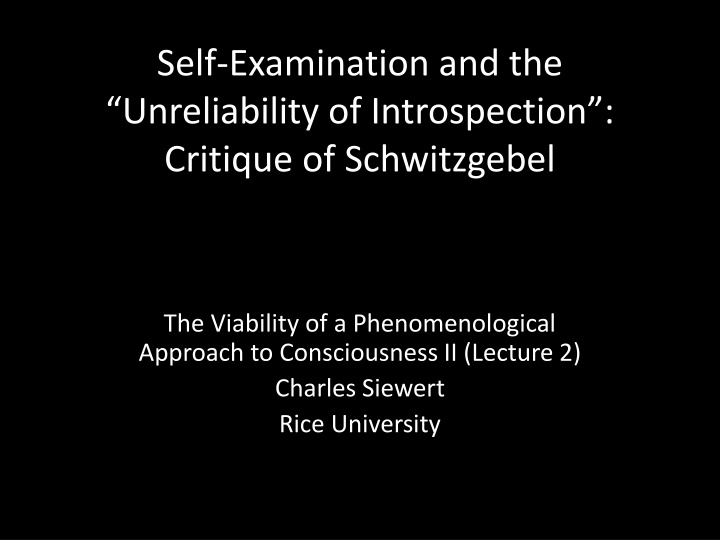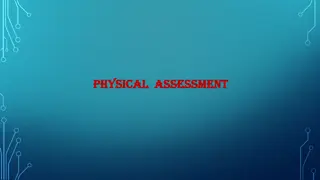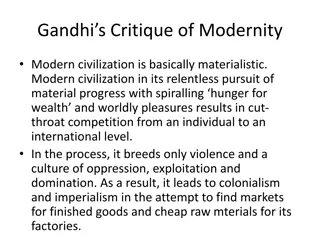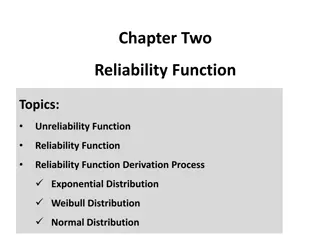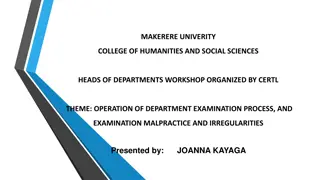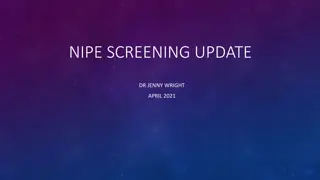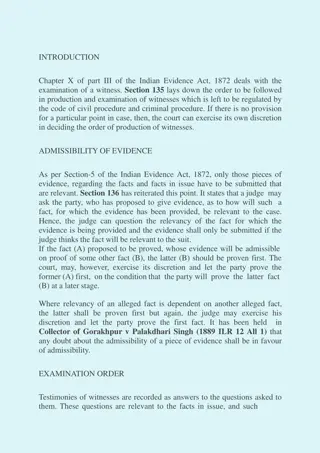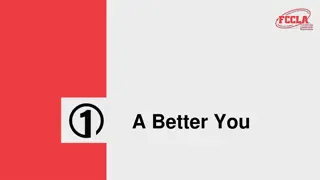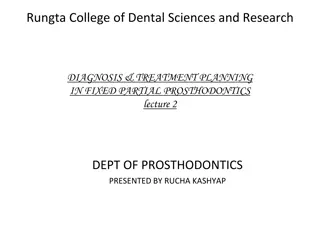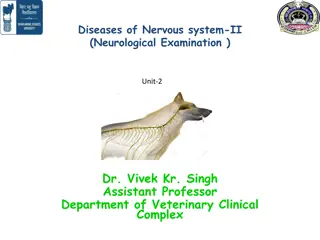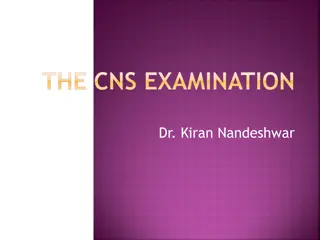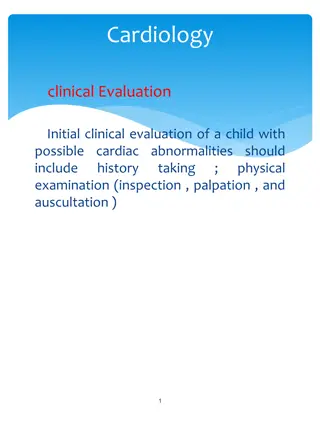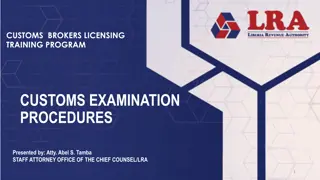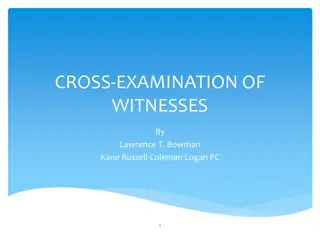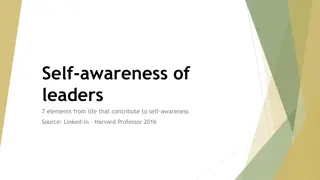Critique of Self-Examination and Unreliability in Introspection
The discussion revolves around the viability of a phenomenological approach to consciousness, critiquing the reliance on introspection and the unreliability of first-person judgments. The argument favors plain, analytical phenomenology over heterophenomenology, highlighting the challenges posed by fallibility and the need for critical first-person reflection in the study of consciousness.
Download Presentation

Please find below an Image/Link to download the presentation.
The content on the website is provided AS IS for your information and personal use only. It may not be sold, licensed, or shared on other websites without obtaining consent from the author.If you encounter any issues during the download, it is possible that the publisher has removed the file from their server.
You are allowed to download the files provided on this website for personal or commercial use, subject to the condition that they are used lawfully. All files are the property of their respective owners.
The content on the website is provided AS IS for your information and personal use only. It may not be sold, licensed, or shared on other websites without obtaining consent from the author.
E N D
Presentation Transcript
Self-Examination and the Unreliability of Introspection : Critique of Schwitzgebel The Viability of a Phenomenological Approach to Consciousness II (Lecture 2) Charles Siewert Rice University
Wrapping up the discussion of Dennett A key methodological disagreement in the study of consciousness. Which way should we go? NO PRESUMED FP AUTHORITY (Dennett s heterophenomenology (HP)): FP reports of beliefs about experience are presumed to have dictatorial authority but those beliefs themselves are presumed to have no authority at all unless and until their accuracy is confirmed by third-person theorizing. DEFEASIBLE FP AUTHORITY (e.g., my plain, analytic phenomenology: (AP)): the fact that someone makes a sincere FP judgment about experience gives one some reason to accept its truth, but doesn t guarantee this: the judgment is still open to rational correction at least partly, and significantly, by appeal to further critical first-person reflection.
My basic argument in favor of AP, against HP HP NOT NEEDED AS RESPONSE TO FALLIBILITY; AP SUFFICES AND FITS BETTER WITH HOW WE ACTUALLY CORRECT OURSELVES. First, the argument for HP rests on dubious and unjustified claims about what introspection erroneously tells us. Second, to determine whether we really do believe what Dennett says we do, and to correct the errors we make, we can and do rely on first-person reflection without any HP style shift to the third-person. Recognition of, and response to fallibility is compatible with plain, analytical phenomenology. HP NOT NEEDED TO ACCOUNT FOR EXPERIMENTAL PRACTICE; AP FITS BETTER. Experimental study of consciousness does not require HP s implicit no presumed first-person authority principle such a claim plays no essential role in relevant experimental reasoning, which is quite compatible with and better justified by the competing defeasible authority assumption of AP. HP IS COMMITTED TO CLAIMS THAT THREATEN THE RATIONAL STUDY OF CONSCIOUSNESS; AP IS NOT. HP assumes our grasp of experiential concepts does not depend on our ability to apply them accurately in the first-person. If (as is reasonable to think) this is false, HP s refusal to grant FP judgment defeasible authority would deny our understanding of the concepts of experience that figure in our first-person beliefs about it. Additionally, it would de-legitimize critical first-person reflection to correct errors in those beliefs. AP makes no such assumptions and is more desirably neutral.
Another challenge to reliance of FP judgments about experience Eric Schwitzgebel: FP judgment about experience is not just fallible, it is highly unreliable even under the most favorable circumstances. Should we try to do entirely without it then? No, he also thinks we can t study consciousness without it. We re stuck: a perplexity of consciousness. This seems to pose a basic challenge to use of first- person reflection in philosophizing about consciousness.
Schwitzgebel: The Unreliability of Nave Introspection (in Perplexities of Consciousness) His thesis: Introspection of current conscious experience is highly untrustworthy, at least as commonly practiced. (118) We fail not only in assessing the causes of our mental states We make: gross enduring mistakes about even the most basic features of our currently on-going conscious experience, even in favorable circumstances of careful reflection, with remarkable regularity. (120)
ESs Main Categories of Introspective Failure With questions about emotional experience With questions about visual experience. With questions about the experience of thinking, understanding.
ESs questions about emotions supposed to reveal the unreliability of introspection(120) Do emotions (such as anger, joy, and fear) sometimes occur unfelt, not phenomenally conscious? Does the experiential character of one of these types often vary (eg is joy sometimes a thrill sometimes an expansiveness, sometimes visceral , sometimes cognitive)? Is emotional experience simply the experience of bodily arousal and bodily states? Emotions located in space consistently and in particular regions of the body? Transitory or enduring? Admit it: introspection fails to answer these questions, you can be wrong about them when you try to answer them introspectively. Conclusion: even the grossest features of our emotional experience largely elude us.
Can we doubt were having color experience? Dream delirium: ES thinks his sister is a seal. Why not: wrongly thinks he dreams in color? Why not: malevolent neuroscientists cause him when awake to think things look colored (e.g., red) when they don t? Can lack certainty about judgments re sense experience, not just re the external world.
The detail of visual experience How much presents itself to you at any one moment as clearly in visual experience with shapes, colors and textures all sharply defined ? Don t you (introspectively) think: a fairly wide swath of what s before you (e.g. a desk)? You do, but you re wrong!
Showing youre wrong about detail of your visual experience Fixate on a point hold your eyes steady while you reflect on your visual experience outside the fovea. Now take a book in your hands and let your eyes saccade around its cover while you think about your visual experience in the regions away from the precise point of foveation. Most people seem to discover that visual experience does not consist of a broad, stable field flush with precise detail, hazy only at the borders the center of clarity is tiny, shifting rapidly around a rather indistinct background. Most of my interlocutors confess to error in having originally thought otherwise. (126)
Cognitive Phenomenology Think about what you plan to do after you finish reading Was there something it was like to have that thought? Set aside any visual or auditory imagery you may have had [W]as there something in your experience, something besides the imagery, something that might qualify as a distinctive phenomenology of thinking? ...Must disagreements about such matters be merely linguistic or about philosophical abstracta?
Schwitzgebel introspection of current conscious experience is faulty, untrustworthy and misleading frequently and massively mistaken, about a great variety of issues. (129)
Opening Worry: maybe ESs examples only show we can introspect unsuccessfully by asking poor (or poorly understood) questions The questions he puts to introspection are often (relevantly) imprecise, ambiguous, misleading, and poorly or divergently understood. Consider expressions he uses: a fairly wide swath, at a moment, tiny or broad center of clarity, visual experience outside the fovea, phenomenology, emotion, consciousness )
Neglect of distinctions Bad introspection? Is it really clear that his interlocutors thought the area of [visual] clarity at a moment was much bigger than they discovered it to be when they paid more careful attention? Are they sure that: (a) earlier they definitely thought there was much more clarity at a single moment than they later realized? Maybe all that was going on was : (b) earlier they didn t notice how little clarity there was at a single moment. in which case they actually weren t previously regularly making errors about the area of clarity experience in a single moment.
Another worry: do you really regularly form grossly erroneous beliefs about how much you clearly see at a moment? Do people really regularly form opinions about how much visual clarity they experience at a single moment? Maybe we are likely to form such judgments only when prompted to do so by a philosopher or psychologist. And even then, what are we thinking of as a single moment here? Would subjects avow having previously had beliefs about the size of their area of clarity in split second durations?
Do you really regularly form grossly erroneous beliefs about how much you clearly see at a moment? Anyway, is there enough precision and consistency in our conceptions of at a moment, tiny, and fairly wide to convict us of frequent gross error here? If we tend to overestimate somewhat how much we clearly see in quite brief temporal intervals, is this really a gross error? Aren t we pretty accurate in being able to tell whether we re seeing something in more detail or less now than before? Why not focus on the accuracy of these comparative judgments if we are trying to determine how accurate introspection is about how much we visual experience?
Do you form false introspective judgments under favorable circumstances of careful reflection ? Often the disagreement, error and indecision ES notes arise because of problems with the questions he asks and our interpretation of them. In that case, ES s main conclusion is wrong: introspective error does not arise in favorable circumstances of careful reflection. For whether the circumstances are favorable and the reflection is careful depend on what questions we pose and how well we understand them. At most Schwitzgebel is showing that introspection is unreliable in unfavorable circumstances deficient in careful reflection. And notice, in the visual case, careful introspection corrects the error, according to ES himself his position is apparently inconsistent.
ESs questions about emotions Are all emotions felt? Do they always have bodily location (are they experienced as, e.g., in your head ?) How much and how often does the way anger or joy feels to you vary? If introspection fails to answer these questions, does that show it is unreliable?
Should we expect ESs questions to be directly answerable by introspection? Many require assessing generalizations about duration and frequency we shouldn t expect introspection to secure. For example: Are all emotions felt? Do they always have bodily location (are they experienced as, e.g., in your head ?) How often does the way anger or joy feels to you vary? If there are unfelt emotions, they are introspectively inaccessible so why should we expect introspection to tell us whether there are any? Memory is often fragmentary and imprecise. I generally don t have sharp detailed memories of a large countable number of anger, joy and fear episodes to draw on, in assessing such generalizations. Does that show introspection is unreliable? There is unclarity about what counts as an emotion and what it means to say it is localized in one s head what kinds of variability we re looking for is that because of the unreliability of introspection?
Let s grant that naive introspection doesn t reliably tell us whether emotions are sometimes unfelt; whether they are always felt in one s body; how often experiences of anger or joy vary. That simply does not show, as ES says, that we make gross enduring mistakes about even the most basic features of our currently on-going conscious experience with remarkable regularity. That would be true, only if introspection regularly tells us we feel angry or sad or elated when we don t, or regularly tells us such emotions involve bodily feelings when they don t, or regularly tells us such experiences vary more than they do. But ES gives us no evidence of any of this. Sometimes ES changes the thesis to something like: we are not excellent nearly infallible judges of our emotional phenomenology. Ok, but this a much weaker thesis, and is very different from saying we frequently make gross enduring mistakes about its basic features.
The real moral: good introspection sometimes requires philosophical analysis, self-examination Sometimes the issues in effect concern reducibility of one kind of experience to another: is emotion simply bodily arousal? Is what it s like to think just a matter of sensory experience and imagery? But addressing such questions should involve more than simple introspective judgment: it calls for philosophical reflection and criticism. E.g.: How should we interpret the visceral vs cognitive distinction? Would what it s like for me to feel angry have been just the same if all the thoughts I had when I was angry were absent? Disagreement and indecision here only show that, where some questions are concerned, introspection should be integrated with philosophical self- examination. We should not use introspection to address such questions in the same way we use it to answer questions like, does this look orange to you?
ESs one-sided assessment If we want to assess the general reliability of introspection shouldn t we also ask if there are a lot of questions about ongoing experience that don t generate disagreement or indecision? When we think we are angry or afraid or irritated, are we not very often correct about this, even if we are sometimes uncertain about (eg) questions about the universalizability of emotions bodily localization or the reducibility of affective experience to sensations of bodily arousal ? When we take this into account, will we be able to claim that introspection about emotional experience is massively and frequently mistaken?
My basic objections ES s main thesis: We make GROSS ENDURING mistakes about even the most BASIC FEATURES of our currently on-going conscious experience, even in FAVORABLE CIRCUMSTANCES OF CAREFUL REFLECTION, with remarkable REGULARITY. ES s argument fails for two basic reasons: HE FAILS TO SHOW REGULARITY OF GROSS ERROR. HE FAILS TO SHOW ERROR IN FAVORABLE CIRCUMSTANCES OF CAREFUL REFLECTION .
#1 FAILURE TO SHOW REGULARITY OF GROSS ENDURING ERROR. The questions he poses to introspection are not ones it is regularly called on to answer, and it s unclear the purported errors are really so gross . So our mistakes here can t show we make gross introspective errors with remarkable regularity And he neglects consideration of cases in which we seem to be fairly regularly correct in answering the questions introspection is typically used to answer.
#2 FAILURE TO SHOW ERROR IN FAVORABLE CIRCUMSTANCES OF CAREFUL REFLECTION . The mistakes, or disagreements, or uncertainties he discovers arise from defects and differences in the manner in which introspection is interrogated. If the questions we pose introspection are in various relevant ways inappropriate, poorly framed, or poorly understood, we do NOT have favorable circumstances of careful reflection. Note: in the visual case he himself, in effect, purports to show the errors are introspectively correctible in favorable circumstances of careful reflection.
The Positive Side Critique of ES s attack on introspection indirectly shows us how to introspect well in favorable circumstances of careful reflection . Helps us to make the case for the legitimacy of self-critical phenomenology.
The real lesson of Dennetts and Schwitzgebels attacks on introspection: don t be a na ve, careless introspector! Introspection should not be viewed as a mechanism for generating first- person judgments about experience whose epistemic quality is to be assessed by posing just any sort of questions about experience, and seeing whether confident, inter- and intra-subjectively consistent answers pop out. Rather introspection or better, first-person reflection should be seen as involving a way of inquiry which, like any inquiry, can be conducted well or poorly. It is conducted well insofar as: the questions posed are appropriate to the issue in question and to the manner of answering them, these questions are, along with the implications of our answers to them, adequately clear and well-understood, and this inquiry is done in such a way as to enable us to recognize and correct errors.
Can we conduct first-person reflection in a way that meets such conditions? Recall what we can do when confronted with Dennett s suggestion that we erroneously introspectively think that the visual field is equally detailed all the way out Recall what we do with Schwitzgebel s notion that introspection wrongly tells us we clearly see a fairly wide swathe in a moment . We improve our first-person judgments about experience by engaging in a practice of analysis (drawing distinctions, exposing assumptions) that is fostered by philosophy. Surprising (?) conclusion: examination of cases supposed to downgrade the epistemic status of introspection on experience actually help legitimize a certain practice of first-person reflection: analytical phenomenology
